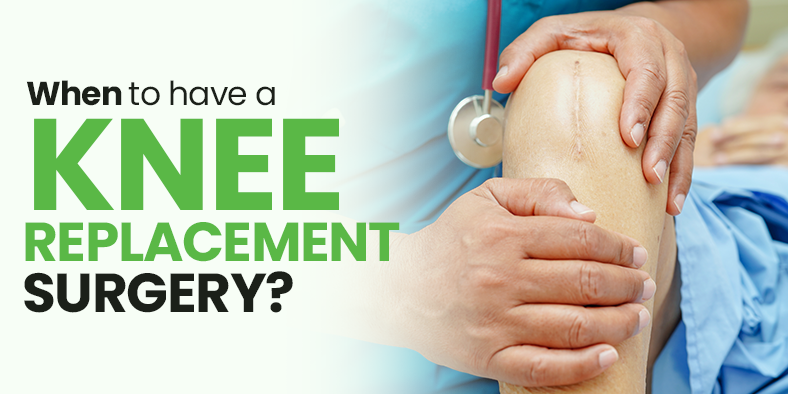Knee problems are becoming more common in India these days! People of nearly all age groups are affected with knee problems, and it can make walking upstairs challenging.
Most of these knee pain issues are the result of serious injury from an accident, ageing, an injury to the leg, an unstable fall, postural abnormalities, wear and tear, or too much pressure. Over time, the knee problem can worsen and limit movement.
But the good news is that any knee discomfort can be curable these days. For millions of patients with knee issues, knee replacement surgery may be one of the good option that has improved their quality of life.
During a full knee replacement surgery, the injured ends of the bones and any hard cartilage that may still be present are removed and replaced with prostheses, which are artificial bones that allow the knee joint to move painlessly and smoothly as earlier. Knowing when to get a knee replacement surgery is important, even if it’s a regular course of therapy.
When Should I Have A Knee Replacement Surgery?
- Continuous Knee Pain
You should think about knee replacement surgery if traditional measures like physical therapy, injections, and medication are no longer effective in relieving your knee discomfort.
- Experiencing Osteoarthritis
Osteoarthritis can seriously impact all of your movements. One possible treatment for the discomfort would be a knee joint replacement.
- Stiffness And Swelling In The Knees
Stiffness and swelling in the knees often results in knee replacement surgery due to severe joint damage from arthritis or injuries, impairing mobility and causing chronic pain. The surgery involves removing damaged cartilage and bone, then implanting metal and plastic prosthetic components to restore knee function and alleviate pain.
- Accidental Knee Injuries
Any accident that causes inability in leg to bend in and out, knee surgery can be a possible choice. Ignoring such knee problems can be dangerous and may cause complete movement inability.
Read More: The Best ACL Surgeon in Punjab
What Are The Types Of Knee Replacements?
Your knee replacement specialist will advise either a full or partial replacement according to the knee injury:
Total Knee Replacement Surgery
The most common type of knee replacement is a total knee replacement. The main three components of your knee joint is the medial, lateral, and patellofemoral that will all be replaced by your knee surgeon.
Partial Knee Replacement Surgery
Partial knee replacement surgery involves replacing only the damaged part of the knee, preserving healthy bone and tissue. During the procedure, the surgeon removes damaged cartilage and bone in the affected knee compartment and replaces them with metal and plastic components, resulting in less recovery time and improved knee function.. After suffering an injury or trauma, new age persons are more likely to need partial knee replacement surgery.
How Do I Get Ready For Knee Replacement Surgery?
You will get instructions from your surgeon and healthcare professional on how to prepare for surgery. Typically, you’ll require:-
- A physical examination to confirm that you are fit enough for knee surgery
- A number of blood tests
- ECG to assess your heart condition
- A dental examination to deny infection after knee surgery
- A set of imaging tests, such as an X-ray of the knee, computed tomography (CT) scan or magnetic resonance imaging (MRI) may be suggested.
Inform your surgeon and your healthcare provider about all of your previous medicines. Before your knee operation, you might need to stop using certain drugs or supplements for precautionary measures.
Your knee surgeon will advise you on when to eat and drink a day before surgery. The majority of patients need to avoid food or drink 12 hours before the knee joint replacement.
What Happens When Your Knee Is Replaced?
You will be given anaesthesia on the day of your knee procedure to ensure painless surgery. Either a regional aesthetic to numb you from the waist down or general anesthesia to put you to sleep during your knee surgery will be administered by an anaesthesiologist.
Your surgeon will do these things during knee surgery
- Make an incision in the knee to access the joint
- Remove damaged cartilage and bone from the thighbone, shinbone, and kneecap
- Shape the bone surfaces to fit the prosthetic components
- Attach metal implants to the ends of the bones
- Insert a plastic spacer between the metal components for smooth movement
- Close the incision and apply a bandage.
What Advantages Come With Having A Knee Replacement?
A knee replacement generally results in pain reduction, increased mobility, and an improved quality of life for the patient. The majority of knee replacements should last 15 to 20 years at the very least. You may take up a variety of low intensity sports after you have recovered, including riding, walking, swimming, or golfing.
What Are The Probable Side Effects Of Knee Replacement?
Even after having a trusted knee replacement, some patients may suffer pain and other symptoms in their knees area. Uncommon side effects consist of:-
- Blood clotting
- Infection near your operation area or within your knee
- Nerve problems
- Problems with blood vessels
- Issues with the prosthetic implant, such as premature wear and loosening of the device
- Scar tissue inside your knee
- Stiffness and a decreased range of motion in your knee
The healing process in case of full knee replacement surgery may be more challenging in several cases. Discuss your medical background in details with your surgeon. Inform them if you have suffered from these health conditions:-
- Haemophilia
- Diabetes
- Any autoimmune diseases
What Is The Average Recovery Period After Knee Replacement?
After a successful total knee replacement, complete recovery typically takes a year. However, six weeks after surgery, you should be able to get back to most of your regular activities.
A number of variables may affect how quickly you recover, that includes:-
- Physical activity after the surgery
- Your age
- Further additional medical issues.
A personalized post-surgery recovery plan from your surgeon will be provided, along with the plan you should do these activities:
Icing your knee: Applying ice to your knee for 20 minutes continuously, several times a day, can help reduce discomfort and swelling in knees.
Elevating your knee: Try to maintain your knee above your heart as much as you can. If you are lying down, you may use cushions or pillows to support your leg, or if you are seated, you can place it on a footstool.
Keeping the operation area clean and covered: keep your operation area lean as per the instructions provided by your knee surgeon. Ask your surgeon when it’s okay to wash the affected area or take a shower, as well as when to change the dressing over the site of your incision.
Doing exercise at home: your surgeon will give you a set of exercises to perform at home after knee surgery. To support the muscles surrounding your knee and avoid stiffness, they will show various motions and exercises for you to do. Perform your workouts as frequently as your physician directs on a daily basis. They will ensure that your joint regains its original function and support in your healing process.
Physical therapy: Following your knee surgery, you may consult a physical therapist for a few months. They will assist you in getting started with the safe movements, such as walking and bending your knee.
Knee Replacement Surgery In A Nutshell
Making the decision to go for knee replacement surgery is not an easy decision. You may feel nervous and have a lot of related questions. Discuss every concern you may have with your surgeon pre and post-surgery.
The knee replacement surgery might take months to fully recover, but by doing some activities you can get faster recovery. Following a knee arthroplasty, the majority of patient’s experience reduced discomfort and improved range of motion.For more information meet Dr. Siddharth Aggarwal: Best Orthopedic Doctor in Chandigarh


